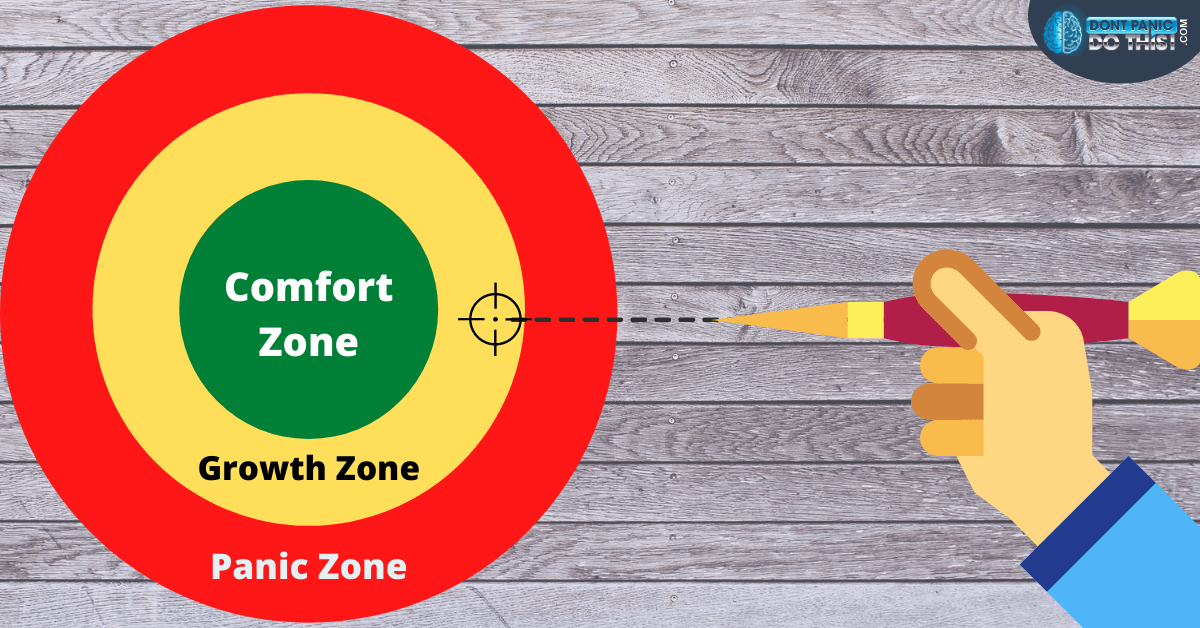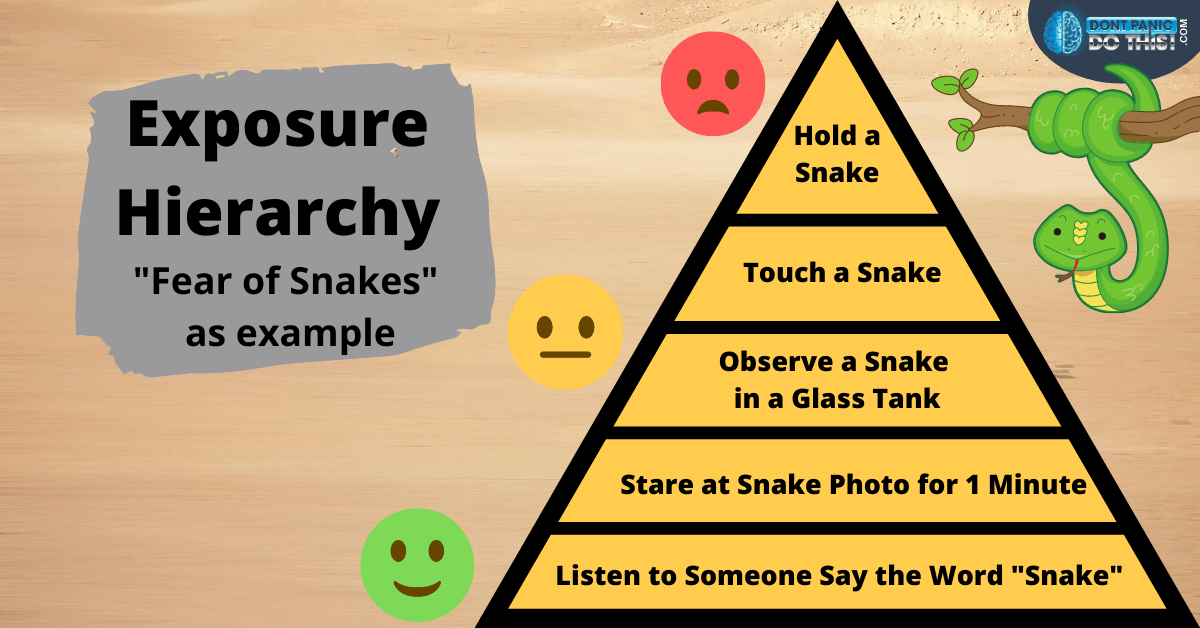Having to give a presentation at school or work can be a stressful situation for many of us. While it’s usually best to face our fears, sometimes we just aren’t ready to stand in front of the class. When anxiety gets the best of us, here’s how to get out of a presentation for class:
- Check the Syllabus in Advance for Class Participation Requirements
- Communicate to the Teacher and Request Alternative Assignments
- Keep a Valid Excuse Handy Just in Case
- Offer to do More of the Work for Less of the Speaking
- Pre-Record Your Presentation or Use Other Presentation Tools
- Consider Online Classes
Not all of these options will work on every teacher or professor, so it’s good to learn them all.
Regardless, at least one of these options will work in 99% of situations.
Why Should You Know How to Get Out of a Presentation?
Make no mistake about it: This website is about beating anxiety and panic attacks; not avoiding them.
So why am I dedicating an entire article to how to get out of a class presentation?
The simple answer is: I’ve been there.
Anxiety, especially social anxiety, starts to rear its ugly head right around high school or college for most of us. This is a difficult, and often confusing, chapter of our lives. We’re learning who we are and how our brain works while simultaneously juggling our social, romantic, and academic lives.
Standing in front of the class stressed me out so much in high school and college, I spent more time avoiding presentations than I did studying. My daily anxiety was so bad, it's surprising I didn’t just drop out altogether. This kind of environment was simply non-conducive to learning for me.
While I didn’t always avoid presentations, I sure did skip a lot of them. Unfortunately, skipping presentations reflects poorly on your GPA, which doesn’t always feel fair; After all, you’re an anxious student, not an incompetent one!
This article is for any student who is desperately nervous about a class presentation coming up. For anyone who doesn’t want their GPA to suffer or to have to quit school due to social anxiety; anyone who just isn’t ready to be pushed into facing a phobia before they’re ready.
Of course, ultimately, I want to see my readers conquer their fear of public speaking once and for all. Head over to this article if you’re ready to overcome presentation anxiety and stage fright for good.
For everyone else, let’s just focus on how to get out of a class presentation for now.
Why am I Nervous About Speaking in Front of Class?
If anxiety and panic attacks are new to you, they can be pretty overwhelming and confusing. Perhaps something simple, like giving a speech in class, is making you nervous when it never did in the past. This is totally normal and was my experience as well.
Before my first few panic attacks, I would’ve never understood the fear of public speaking. Sometime in early high school, I had a completely random panic attack while giving a speech. Thankfully, it largely went unnoticed, but it made me anxious about every class presentation to follow.
A fear of public speaking can develop for a number of reasons. For many people, it’s a genetic predisposition to social anxiety; at a certain age, we start to worry more about what people think. For others, we learn to associate a negative or traumatic experience with the situation and become anxious when we think about it.
While it may not make sense for us to panic in such a harmless situation, there’s an evolutionary explanation for this. Since our brains evolved to their current form many years ago, some systems once intended to assist us now simply cause us stress. Being surrounded by a crowd may be harmless today, but to our ancestors it may have posed a very real risk.
If you’ve got some time to kill, check out this piece on the evolutionary psychology behind anxiety.
How to Get Out of a Presentation for Class: 6 Tricks
1. Check the Syllabus in Advance for Class Participation Requirements
*Note – This trick is specifically for college students and may not work in high school*
Something I learned early on in college was that I simply learned better on my own. This was no disrespect to my professors of course, they were all great! But I was a psychology student who was genuinely fascinated by the course material.
I was content to read the textbooks by myself from the comfort of my dorm room. Struggling to stay awake in a 9am lecture hall, or nervously shifting in my seat before a class presentation, did nothing to improve my understanding of psychology. I learned best on my own.
Knowing this, I devised a system for how to avoid class presentations and class participation in general. I called this trick the “Take 7, Drop 5” method. Here’s how it worked:
- During class enrollment, I would sign up for 7 classes per semester (The standard course-load was 5). These could be any classes that would count toward my degree.
- I'd wait for the first week of class to come and go (syllabus week).
- I’d skip syllabus week altogether (you better believe my social anxiety didn’t want to play icebreaker games).
- Now I’d look on the student portal to read the posted syllabus for each class. The syllabi are typically used as a loose contract to inform the student of how their grade will be determined.
- If I saw a class where the grade was heavily dependent on participation (e.g., 40% of the grade coming from speaking in class, attendance, or group projects) I would drop it.
- In general, I favored classes where the professors did not assign projects, or even grade attendance. Classes where the daily lectures were posted online were ideal for me.
- In the end, I would drop two out of seven classes I originally enrolled in. This came with no penalty since I would drop within the first few weeks. I’d end with a standard course-load of 5 classes.
- Repeating this process each semester, I managed to get great grades largely from the comfort of home. I would only really have to go into most classes to take the tests.
Funny enough, I actually had a number of friends ask, “I never see you in class, how are you passing?”
The reality was, this is how I learned best; self-guided and from home. It’s not a system that works for everybody, but it’s an option for anyone wondering how to avoid class presentations and participation.
2. Communicate to the Teacher and Request Alternative Assignments
I firmly believe that most teachers and professors really do want their students to succeed.
As professional public speakers, it can be easy for teachers and professors to forget that some students are socially anxious. Sometimes, they may want to push students to face their fears and grow.
Regardless, no teacher can know what you’re feeling unless you communicate with them.
The absolute easiest way to get out of a class presentation is to talk to your teacher about it. Sure, this can feel like an embarrassing and difficult topic to bring up. Nonetheless, I promise you are not the first person your teacher has spoken to about a fear of public speaking.
You can pull your teacher aside for a private conversation, or even reach out to them via email. Let them know how hard it was for you to even come to them and open up about this issue. Explain to them that you are going through something difficult right now with your anxiety.
Most teachers will be able to sympathize with your situation and perhaps propose an alternative assignment for you. Others, however, might insist that the best way to conquer this fear is to tackle it head-on (which isn’t false). You can assure them that you plan to address the issue in your own way eventually; for now, you’re just looking for some compassion.
The important thing here is honesty and compromise.
Teachers deal with a lot of lazy students who come up with all kinds of excuses to get out of work. You want to make it clear to your teacher than this is not your intention.
Suggest a compromise.
Perhaps, rather than giving a 5-minute presentation, you could write a 5-page essay?
Make some ambitious suggestions and see if you can come to an agreement. After all, as long the work is getting done and you’re learning, isn’t that the most important thing?
I made these kinds of compromises with professors on a number of occasions. I’m not too proud to admit that one time, I even gave my presentation to the teacher privately in an empty room.
Be honest, open, and willing to put in hard work, and most teachers will be willing to work with you.
3. Keep a Valid Excuse Handy Just in Case
Perhaps the least ethical of my suggestions today, but this worked for me enough times to make the list.
Ah yes, the age-old “my dog ate my homework” trick.
The simple fact is, things do come up in our lives that require us to take a day off from class.
For Missing a Presentation or Class
The key to a good excuse is that it's out of your control and doesn't reflect poorly upon your reliability. Ideally, it's also something that cannot be disproved; if you use an excuse like a canceled flight, actually look up flight cancelations from the night before.
If you’re going to use one of these excuses, you should let your teacher or professor know immediately. Waiting a week to give them your excuse takes away from your reliability and credibility. Inform them of your “situation” immediately, and ask for a chance to make up the assignment.
It’s unlikely your presentation would be rescheduled to cut into another day’s lesson. More likely, your professor will ask you to email your project over or present it privately during office hours.
Fun Fact: During my worst days with panic attacks and anxiety, I truly used some ridiculous excuses to avoid presenting. I’m by no means proud of this (it’s very embarrassing) … but one time, I went up to the professor with tissues pressed to my nose. I told her I had a nosebleed and had to go to the restroom. I handed her my speech and just never went back. Fortunately for me, she accepted and graded it.
Like I said, by no means do I think making excuses is the best long-term strategy. I’d just rather give any extremely anxious students an option beyond dropping out entirely.
4. Offer to do More of the Work for Less of the Speaking
If negotiations with your teacher or professor don’t go so well, you can always talk to your peers.
The good thing about public speaking in school is that most assignments are group presentations. If you can’t figure out how to get out of a group presentation, you can at least talk to your groupmates about how you’re feeling.
In today’s day and age, people are much more open and understanding of mental health issues. Anxiety is no different, and most people are aware that other people experience a degree of stage fright. With any luck, someone in your group will have less of an issue with this.
Something you might consider is asking to take a lesser role speaking in the presentation. If the other students are anxious as well, this may be a hard sell; but at least then you have some solidarity.
Otherwise, you can offer to do more of the work researching or writing the presentation in exchange for a lesser speaking role – a great deal for anyone who doesn’t mind talking. If all else fails, you can always slip someone a twenty to read your lines (sorry for my loose moral compass).
Note – for group presentations, really make an effort to negotiate a fair arrangement. Be willing to work hard to make up for less speaking. Don’t surprise the group and ditch; it’s unfair to pass your stress over like a baton. Your teacher won’t appreciate it either, and you’ll probably fail.
5. Pre-Record Your Presentation or Use Other Presentation Tools
This is my absolute favorite trick for how to get out of giving a presentation.
With this method, you can create a high-quality presentation without having to stand in front of the class and speak. In other words: Get the A+ without the stage fright.
There are several ways to do this.
The most basic method is simply a pre-recorded video of you speaking to the camera in a “talking head” video. Depending on the quality you want, most people could do this for free by recording with a smartphone or webcam. For better results, use a quality camera and editing software.
Better yet, you could drop the video (or just an audio recording) in the corner of a standard PowerPoint presentation. This way, it’s as simple as hitting “play” and stepping away from the stage. You get the same information across without having to actively speak in front of the class.
The best results (in my opinion) would be to utilize some premium presentation software tools. Among my favorites are Doodly and Toonly, which allow one to easily create high-quality animated videos (don’t worry, they’re extremely intuitive, drag-and-drop style). This is my favorite option because the result looks like you put in more work rather than less.
Check out this article on my favorite presentation software reviews before you spend any money.
6. Consider Online Classes
Not everyone thrives in the traditional classroom setting; I know I didn’t.
For these people, online classes can be a good option.
Now, more than ever before, we’re realizing that colleges can just as effectively teach students online as in-person. Even better, self-paced learning allows the kind of flexibility necessary to receive an education while balancing work and family. It’s often much more affordable as well.
Since I already have an article discussing how online classes can help anxious students, I’ll leave off here. If constantly figuring out how to get out of giving a presentation isn’t your thing, consider online classes.
Why Avoiding Presentations May Not be the Best Strategy
We’ve talked a lot about how to get out a presentation in school.
Now it’s time for me to be responsible and tell you a hard truth.
Avoiding our fears can be a massive relief, but ultimately, it’s a terrible long-term strategy. To actually beat our anxiety, we need to be willing to confront our phobias – even when this is uncomfortable.
My favorite way to do this is through gradual habituation. Basically, exposing ourselves to our fears at a slow, if slightly uncomfortable pace. Through time and practice, our fears are lessened bit by bit. The trick is to step just outside out comfort zone without necessarily “jumping right into the fire.”

Are you constantly looking for ways to get out of giving a presentation at school? Consider what a small step outside your comfort zone may look like. Could you raise your hand a bit more in class? Could you practice your speech in front of five close friends? Maybe you could try and read a poem at a small open mic night?




When you're ready, check out our article on how to overcome the fear of presenting.
Rather than focusing on avoidance tactics, this article will actually help you to beat your stage fright. This is one of the best things we can do for our education, career, and mental health.
FAQs
Unfortunately, unless you have a formally recognized disability, your teacher can definitely “force” you to present. A teacher has every right to fail a student who is unable to give a presentation or speech in class. If you’re anxious, your best bet is to talk honestly with your teacher to try and find a compromise.
While this article focused on students in high school and college, most of the same tactics can be used at work. Since work will more likely be about results than a graded task, the best option here is likely to use presentation tools. This should make your boss happy while also helping to minimize your stage fright.
Take control of your breathing; 4 seconds in, 7 second hold, 8 seconds out. Find a focus object in the room to focus your thoughts on whenever your mind starts to wander anxiously. Look for a friendly face in the crowd if you get too nervous. Remember that this will all be over in just a few short minutes.

